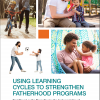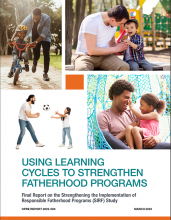0
Report
Community:
May 1, 2023
Federally funded Responsible Fatherhood programs work with fathers to promote healthy relationships and marriages, strengthen parenting practices, and help fathers attain economic stability. For programs to improve fathers’ outcomes, they need to be able to recruit fathers, engage them in services, and keep them actively participating in program activities. However, it is challenging for programs to achieve these participation goals. The Strengthening the Implementation of Responsible Fatherhood Programs (SIRF) study was designed to strengthen programs and build evidence on promising practices to improve the enrollment, engagement, and retention of fathers in program activities. Fatherhood programs participating in SIRF iteratively implemented and assessed promising approaches to addressing implementation challenges, with the support of and in partnership with the SIRF team.
Authored by: Charles Michalopoulos, Emily Marano, Becca Heilman, Michelle S. Manno, Patrizia Mancini, Scott Cody for MDRC
Topics: Family engagement, Healthy homes, Legislation & Policy, Low-income, Research, Stability
 Shared by Sandra Ware
Shared by Sandra Ware
Sandra Ware posted a
on Jun 1, 2023
Charles Michalopoulos, Emily Marano, Becca Heilman, Michelle S. Manno, Patrizia Mancini, Scott Cody for MDRC
Federally funded Responsible Fatherhood programs work with fathers to promote healthy relationships and marriages, strengthen parenting practices, and help fathers attain economic stability.
0
Video
Community:
Jun 17, 2022
The Vancouver Housing Authority collaborated with a Federally Qualified Health Center and a homeless crisis response system to develop a network of scattered-site and site-based supportive housing. This moderated discussion will cover how VHA paired Housing Choice Vouchers and public housing with a Medicaid-funded supportive housing benefit to serve people identified by the community’s Coordinated Entry as needing supportive housing. Speakers will also discuss the challenges faced through the process, model adjustments made, and evaluation of the work through matching housing data and Medicaid utilization data.
Authored by:
Topics: Advocacy, CLPHA, Data sharing, Family engagement, Health, Healthy homes, Homelessness, Housing, Legislation & Policy, Low-income, Research, Stability, Sustainability
 Shared by Karina George
Shared by Karina George
Karina George posted a
on Jun 17, 2022
The Vancouver Housing Authority collaborated with a Federally Qualified Health Center and a homeless crisis response system to develop a network of scattered-site and site-based supportive housing.
0
Video
Community:
Jun 17, 2022
This session will review the extent to which local jurisdictions engaged with school districts in the 2016-17 Affirmatively Furthering Fair Housing (AFFH) process and preview the potential for PHAs to engage with school districts and school data in the upcoming renewal of the HUD AFFH process.
Authored by:
Topics: Advocacy, Attendance, CLPHA, Data sharing, Education, Family engagement, Housing, Legislation & Policy, Research, Sustainability
 Shared by Karina George
Shared by Karina George
Karina George posted a
on Jun 17, 2022
This session will review the extent to which local jurisdictions engaged with school districts in the 2016-17 Affirmatively Furthering Fair Housing (AFFH) process and preview the potential for PHAs to engage with school districts and school data in the upcoming renewal of the HUD AFFH process.
0
Report
Community:
Feb 1, 2019
In the summer of 2018, Ascend gathered more than two dozen state and national policy experts and other leaders in the fields of health and early learning at its Aspen Meadows Campus in Aspen, Colorado, to discuss the growing opportunity to leverage the 2Gen approach at the state level and determine how best to take promising new innovations to scale. This report offers a snapshot of specific things federal, state, and local leaders can keep doing, start doing, or stop doing to remove barriers and accelerate success.
Authored by: Ascend: The Aspen Institute
Topics: Dual-generation, Early childhood, Family engagement, Legislation & Policy, Research
 Shared by Housing Is
Shared by Housing Is
Housing Is posted a
on Feb 15, 2019
Ascend: The Aspen Institute
In the summer of 2018, Ascend gathered more than two dozen state and national policy experts and other leaders in the fields of health and early learning at its Aspen Meadows Campus in Aspen, Colorado, to discuss the growing opportunity to leverage the 2Gen approach at the state level and determine
0
Research
Community:
Aug 1, 2018
We sought to learn more about how state- and locally funded rental
assistance programs were created, how they are structured, whom they serve, and how they are funded.
Authored by:
Topics: Cost effectiveness, Data sharing, Disabilities, Family engagement, Funding, Health, Homelessness, Housing, Legislation & Policy, Low-income, Partnerships, Research, Supportive housing
 Shared by Housing Is
Shared by Housing Is
Housing Is posted a
on Aug 1, 2018
We sought to learn more about how state- and locally funded rental
assistance programs were created, how they are structured, whom they serve, and how they are funded.
0
News Article
Community:
Jul 10, 2018
Authored by: Tina Rosenberg for The New York Times
Topics: Child welfare, Criminal justice, Domestic violence, East Coast, Family engagement, Housing, Legislation & Policy, Low-income, Research, Safety, Supportive housing, Youth
 Shared by Housing Is
Shared by Housing Is
Housing Is posted a
on Jul 10, 2018
Tina Rosenberg for The New York Times
0
News Article
Community:
Jul 2, 2018
Poor children don't struggle in school because of their parents. They struggle because of poverty.
Authored by: Mical Raz for The Washington Post
Topics: Attendance, Child welfare, Dual-generation, Early childhood, Education, Family engagement, Food insecurity, Grade-level proficiency, Housing, Legislation & Policy, Literacy, Low-income, Out-of-school time, Post-secondary, Racial inequalities, Research, School-readiness, Youth
 Shared by Mica O'Brien
Shared by Mica O'Brien
Mica O'Brien posted a
on Jul 3, 2018
Mical Raz for The Washington Post
Poor children don't struggle in school because of their parents. They struggle because of poverty.
0
Report
Community:
Nov 1, 2017
Why do some neighborhoods appear able to launch effective local improvement initiatives, while others are more hampered by fragmentation and mistrust? Why can some communities mobilize diverse constituencies to influence public policy, while others cannot? Answers to these questions may be found in the specific patterns of collaboration that form among community organizations, and between these groups, schools, public agencies, and elected officials, according to MDRC, a preeminent social-policy research organization.
Authored by: MDRC
Topics: Asset building, Child welfare, Community development, Data sharing, Dual-generation, Education, Family engagement, Funding, Health, Housing, Legislation & Policy, Low-income, Metrics, Midwest, Mobility, Out-of-school time, Partnerships, Place-based, Preventative care, Research, Safety, Stability, Workforce development, Youth
 Shared by Mica O'Brien
Shared by Mica O'Brien
Mica O'Brien posted a
on Jun 29, 2018
Why do some neighborhoods appear able to launch effective local improvement initiatives, while others are more hampered by fragmentation and mistrust? Why can some communities mobilize diverse constituencies to influence public policy, while others cannot?


 Shared by Sandra Ware
on Jun 1, 2023
Shared by Sandra Ware
on Jun 1, 2023

 Shared by Karina George
on Jun 17, 2022
Shared by Karina George
on Jun 17, 2022
 Shared by Karina George
on Jun 17, 2022
Shared by Karina George
on Jun 17, 2022
 Shared by Housing Is
on Feb 15, 2019
Shared by Housing Is
on Feb 15, 2019
 Shared by Housing Is
on Aug 1, 2018
Shared by Housing Is
on Aug 1, 2018
 Shared by Housing Is
on Jul 10, 2018
Shared by Housing Is
on Jul 10, 2018



